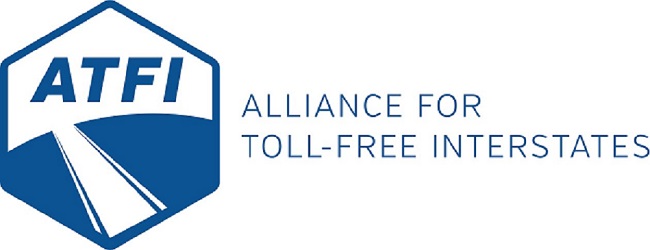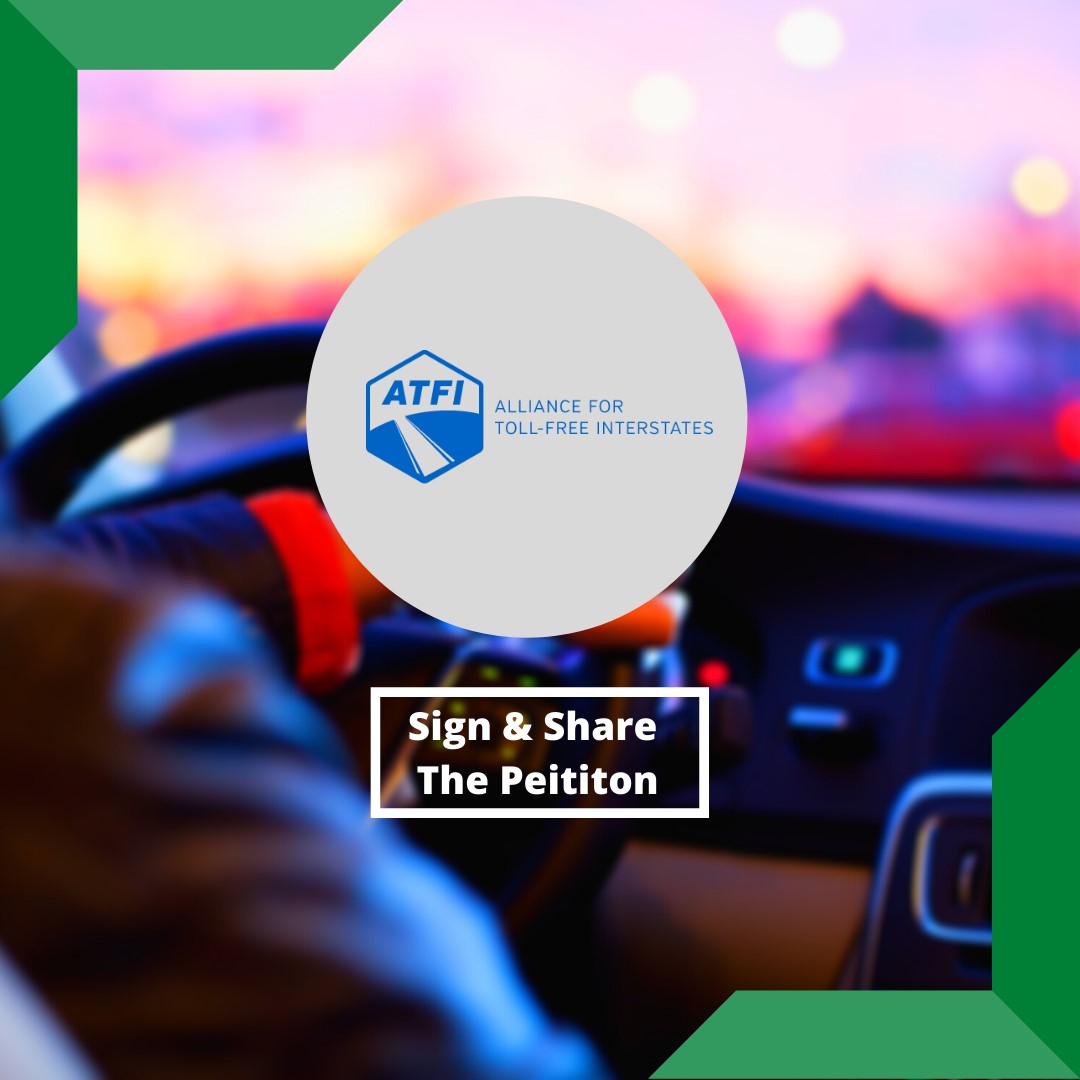At the one-year anniversary of COVID-19’s official arrival in the United States, state governments face unprecedented budget shortfalls as they search for ways to raise revenues for transportation projects in the absence of the proper funds.
The pandemic has kept people off of roads across the country, and transportation departments from Pennsylvania to Wyoming are citing pandemic-related losses and a lack of federal support as incentives for moving towards toll roads.
Unfortunately, the proliferation of tolls would pass the economic burden from state governments to citizens and businesses, forcing interstate users to pay additional taxes on their roads, harming local businesses dependent on interstate traffic, raising the costs of goods transported via interstates, and placing unnecessary strain on the infrastructure of alternate, non-tolled routes.

The Alliance for Toll-Free Interstates or ATFI is a national coalition of individuals, businesses, and organizations advocating for answering our rising transportation needs without tolling existing interstates. The National Motorists Association is an active supporter.
Tolls demolish take-home pay for drivers and are especially oppressive to low-income individuals. At the Alliance, we seek to inform the public, policymakers, and the media about the negative implications that tolling existing interstates has on American communities and businesses and why it will not solve our pressing transportation problems.
State Updates
Alabama
Public opposition to tolls in the state remains strong, and government officials are taking notice. Per recommendations made to her administration by the Metropolitan Planning Organization in Mobile and the Eastern Shore, Governor Kay Ivey has expressed her support for expanding capacity and reducing congestion on the I-10 Bridge across Mobile Bay without placing tolls on existing roads. The governor’s office has instructed the Alabama Department of Transportation to begin studying options to relieve traffic congestion in the Mobile area that keep the existing routes toll-free.
Florida
The Multi-use Corridor of Regional Economic Significance (M-CORES) toll roads have been under debate for more than a year since the Legislature passed the program into law in 2019. “MCORES was created by the Legislature as a forward-looking planning tool” for all types of infrastructure needs, according to Florida Transportation Secretary Kevin Thibault.
While the program is about more than just roads, a major focus has been on the debate over whether new tolled roads should be constructed across large regions of the state or existing major highways should be expanded.
In early February, Florida legislators began considering a substantial change in the project in light of COVID budget restrictions and the possibility of accomplishing similar goals without an entirely new set of toll roads. A considerable scale-back of the original M-CORES program is expected, which ATFI will be monitoring throughout the legislative session.
Indiana
In late January, Governor Holcomb announced that the Indiana Department of Transportation plans to develop a new, four-lane tolled bridge over the Ohio River on I-69.
ATFI voiced its opposition to the project to members of the media, highlighting the negative economic consequences that the tolls would place on businesses in Indiana and neighboring Kentucky. As the state prepares to publish its final environmental impact statement and record of decision, we will continue to monitor this endeavor’s developments.
Oregon
State lawmakers have continued their shift in focus from congestion pricing to tolling on I-5 and I-205. Legislators have proposed House Bill 3055, introduced on January 26, which would allow the Oregon Department of Transportation to utilize tolls in the revenue-raising process.
Meanwhile, public comment continues to be heard about the potential construction of toll roads in the Portland area. The Oregon Department of Transportation received criticism from the North Portland community members claiming that the toll project, dubbed the Comprehensive Congestion Management and Mobility Plan, wasn’t equitable.
In response, ODOT opted to expand the extent of the planned tolls so that more people would be paying. While construction of the proposed tolls would not start until 2024, ATFI and its allies will continue monitoring Oregon’s situation and voice opposition to the project.
Pennsylvania
In mid-February, the Pennsylvania Department of Transportation (PennDOT) announced nine interstate bridges it is considering tolling through its Major Bridge Public-Private Partnership (P3) Tolling Initiative.
The Pennsylvania Motor Truck Association testified in the Senate Transportation Committee in late January, outlining the financial burden that additional tolling would place on the industry. PennDOT is advertising the initiative as beneficial to taxpayers, claiming that the tolls will allow the state to rebuild its transportation infrastructure without siphoning resources from ongoing projects or other future developments.
However, politicians and citizens alike have voiced their frustration with PennDOT’s lack of transparency in identifying the toll project locations while pushing through the tolling initiative’s approval in November 2020 and decried the economic burdens of new tolls on businesses and communities already struggling from the COVID-19 pandemic.
ATFI plans on submitting written testimony for the March 24th hearing, and additional information about opposing these bridges’ tolls is below.
Rhode Island
Following the announcement that the state would begin construction on 10 truck-only toll facilities on Interstate 95, the American Trucking Association (ATA) filed a lawsuit in 2017 against the Rhode Island Department of Transportation. Despite the lawsuit, the first toll booths opened in the summer of 2018.
After numerous appeals, the ATA is moving forward with its lawsuit and will continue the fight in a lower court against tolls. Former Rhode Island Governor Gina Raimondo resigned at the beginning of March to take a cabinet position in the Biden administration as the new Secretary of Commerce. This development adds more ambiguity to the ongoing lawsuit.
Wyoming
The Wyoming legislature is looking at two ways to raise money for transportation improvements. Those two ideas are a fuel tax increase of 9 cents per gallon and a proposal to charge vehicles for every mile they drive in the state. Legislation to create tolling infrastructure on I-80 in Wyoming has been filed in the state legislature.
A similar bill was proposed in the 2020 Budget Session of the Legislature, but it ultimately failed. The proposed legislation, Senate File 73, would allow the Wyoming Department of Transportation to impose tolls on the federally owned highway to pay for operation and maintenance of I-80 in the state. The bill has been referred to the Senate Appropriations Committee and is awaiting scheduling for a hearing.
Federal Update
ATFI and the transportation industry eagerly await to see whether infrastructure funding will be an early priority for the Biden Administration. We will be working to educate the President and his transportation team about the negative consequences of tolling existing interstates, such as high operating costs, significant traffic diversion, and disproportionate effects on local communities.
Our national transportation network will prosper with direct federal investment and the use of more efficient, effective, and reliable ways to generate additional funding for transportation infrastructure.
ATFI continues to be the voice of the anti-tolling movement at the national and state level. As these efforts move ahead, please join us in saying No to Tolls! We must keep highways open!

After you sign the national petition, be sure to spread the word by sharing this with your friends, family, and colleagues to do the same!
We Submitted Public Comment in Pennsylvania Against Tolls!
ATFI submitted public comment in the winter enumerating the many reasons to oppose the tolling of bridges in Pennsylvania, including this excerpt:
“As the Major Bridges P3 project is discussed, ATFI’s members – thousands of private citizens and numerous businesses and organizations – urge the Governor, General Assembly, and P3 Board to fully reject tolling of existing interstates. Pennsylvania needs sustainable investment in infrastructure, not discriminatory, ineffective policies that take more and more money from hardworking motorists and businesses. The needs of Pennsylvania’s transportation network are vast and deserve serious attention without the distraction of tolls.”
In February, Governor Tom Wolf’s Administration and PennDOT finally announced the bridge projects across the state that are being considered as part of the Major Bridge P3 Initiative. The nine bridges are scattered all around the state and are as follows:
• I-78′s Lenhartsville Bridge in Berks County.
• I-79′s bridges over State Route 50 in Allegheny County.
• I-80′s bridge across Canoe Creek in Clarion County.
• I-80′s bridge across Nescopeck Creek in Luzerne County.
• I-80′s bridge across North Fork in Jefferson County.
• I-80′s bridge across the Lehigh River, near Wilkes-Barre.
• I-81 over the Susquehanna River in northern Pennsylvania.
• I-83′s South Bridge across the Susquehanna River, a mile from the state Capitol.
• Girard Point Bridge in Philadelphia.
These tolls will be detrimental for all motorists in Pennsylvania. If you live in Pennsylvania, we really need your help by signing the anti-tolls petition by clicking here. Tolling interstate lanes that drivers now freely access is not only unwanted, but it is also an inefficient financing mechanism that is the worst method available to raising transportation revenue.






